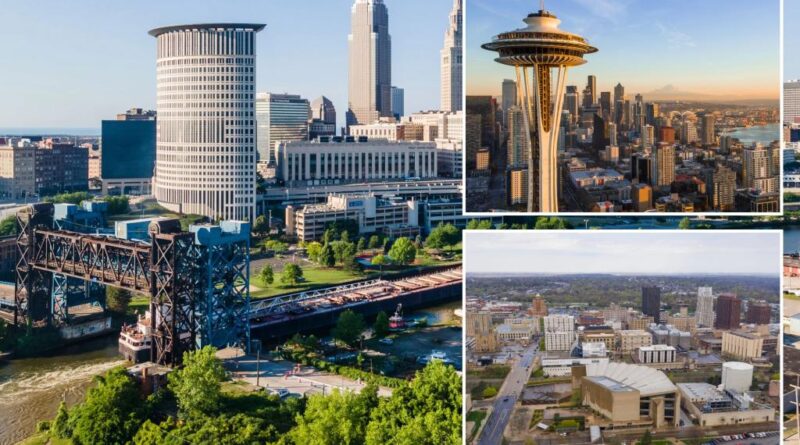The top 10 US cities with the lowest risk of weather disasters – including hurricanes, fires and floods.
As Hurricane Milton heads toward Florida and parts of the South continue to reel in the wake of Hurricane Helene, many may be wondering: Is there a truly safe place in extreme weather?
Indeed, natural disasters have already caused more than 25 billion dollars in damage this year.
And Realtor.com’s 2024 Housing and Climate Risk report found that 44.8% of US homes are at risk of exposure to extreme weather conditions, including extreme heat, wind, floods and wildfires.
These threats not only affect people’s quality of life; they also affect home prices and home insurance premiums.
The Sun Belt regions are among the most disaster-prone areas of the country, and show high insurance premiums. Mississippi—which experienced major flooding this time last year—has insurance rates that are 30% higher than the national average, and Florida home insurance rates are four times higher. national average.
Research from the First Street Foundation estimates that 3.2 million people have become “climate migrants” creating “climate deserts” due to extreme weather conditions.
“There seem to be clear winners and losers in the impact of flood risk on neighborhood population change,” Jeremy Porter, the foundation’s head of climate research, said in a statement. “The ramifications of this are huge and affect property values, neighborhood structure, and business success in both positive and negative ways.”
To help prospective buyers consider current environmental conditions, Realtor.com has created a unique environmental score for listings that allows users to assess the risk of hazards such as hurricanes, floods and wildfires.
Realtor.com economist Jiayi Yu says: “Prospective homeowners can leverage these data to assess climate-related risks in different areas, helping them identify ‘safe’ locations. before they make a final decision. “Living in areas with a low risk of natural disasters offers many benefits to homeowners, including reduced risk of property damage, lower insurance costs and a more stable local economy. This can contribute to a more secure, stable and fulfilling life. Choosing to live in areas with a low risk of natural disasters can help reduce these concerns. ”
Realtor.com also ranked the safest cities to live in across the country based on the percentage of homes that face little or no hurricane, flood or fire damage risk.
If you’re curious about where these safer-than-usual places are hiding, read on.
Akron, OH
Share of low-risk households: 91.1%
The total value of assets at risk is the lowest: $55.4 billion
Cleveland, OH
Share of low-risk households: 89.3%
The total value of the assets at risk is the lowest: $ 163.5 billion
Seattle, WA
Share of households at very low risk: 88.4%
The total value of assets at the lowest risk: $ 784.2 billion
Columbus, OH
Share of low-risk households: 87.7%
The total value of assets at risk is the lowest: $ 197.6 billion
Cincinnati, OH
Share of low-risk households: 87.7%
The total value of assets at risk is the lowest: $ 199.3 billion
Dayton, OH
Share of low-risk households: 87.2%
The total value of assets at risk is the lowest: $57.8 billion
Indianapolis, IN
Share of low-risk households: 86.9%
The total value of assets at risk is the lowest: $ 190.1 billion
Pittsburgh, PA
Share of low-risk households: 84.7%
The total value of assets at risk is the lowest: $ 183.3 billion
Toledo, OH
Share of low-risk households: 83.6%
The total value of assets at risk is the lowest: $ 41 billion
Grand Rapids, MI
Share of low-risk households: 82.2%
The total value of assets at risk is the lowest: $ 93.4 billion
#top #cities #lowest #risk #weather #disasters #including #hurricanes #fires #floods
